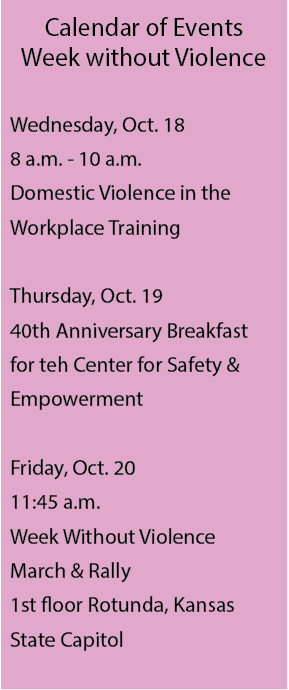WU participates in national week without violence
October 16, 2017
October marks the beginning of Domestic Violence Awareness Month.
From Oct. 17 to Oct. 20, the YWCA, the Interfraternal Council, WSGA, STAND and Washburn University will be hosting the Week Without Violence. The event is annually held during the third week of October.
“We want every week to be without violence, but it’s really about efforts to end domestic violence specifically,” said Tessa Graf, graduate research assistant and director for the psychological services clinic. “College-aged individuals experience very high rates of domestic violence.”
Domestic violence affects men and women, and while the numbers are higher for women, Graf explained that men are less likely to report, allowing the statistics to not be wholly accurate.
“There’s a huge stigma against seeking help or being abused, especially for men,” Graf said. “One of the barriers is that people don’t know how to recognize [abuse.]”
A Week Without Violence was established in the U.S. in 1999. Shelley Bearman, project coordinator and sexual assault educator/preventer, said that the event is meant to bring awareness and ensure people know how and where they can seek help when they experience domestic violence.
“If we could just encourage everyone to stand up and look out for each other, that’s what makes our world a better place,” said Bearman.
This year, there will be at least one event everyday throughout A Week Without Violence.
“The faculty and staff care about what’s happening with our students,” said Bearman. “This is a big, important issue. They see it, and they know the repercussions of it and want to help everyone have a safe learning experience.”
The Week Without Violence will wrap up on Friday, with a march and rally starting at the capitol building. After the march, hotdogs will be cooked and provided by the Topeka Police Department.
“Everyone is welcome to come march,” said Graf. “There’s so much community support for it. We would love to see lots of Washburn people there.”
There are many resources available for students on campus, including a victim advocate and counseling services, and resources in the community such as the YWCA.
“We want to make sure that people know how to get help,” said Bearman. “That no one feels trapped, no one has to live through an abusive relationship.”



